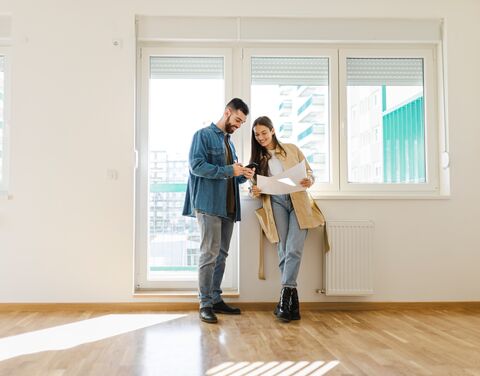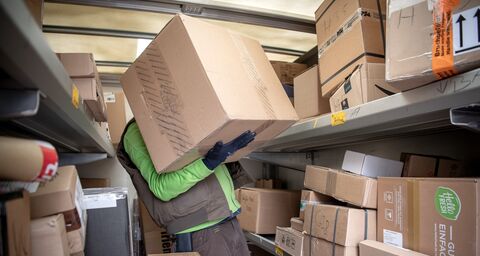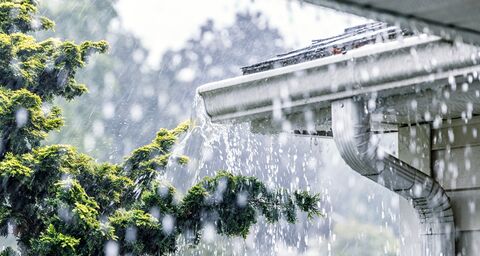
Apartment viewing – what you need to bear in mind
The search for a new apartment is an important phase in life for many people: It often marks the start of a new chapter. We show you how to prepare for an apartment viewing.
During an apartment viewing, you decide whether the apartment fits with your individual needs and expectations. The viewing is more than just an outside look at the rooms, walls, and floors. It allows you much more. For example, to find out more about the neighborhood or to check the transportation connections.
In addition, the apartment viewing offers the opportunity to meet the landlord personally and to leave a good impression yourself. After all, whether or not you get the apartment often depends on significantly more than just having the right documents and the required income. If you see an apartment, you should therefore take note of the following tips.
What should you look for when viewing an apartment?
An apartment viewing is a decisive step on the way to finding your dream home. Real estate platforms such as newhome display a large selection of apartments. You can find out what you should bear in mind when viewing an apartment here:
- Making an appointment: The first hurdle to viewing an apartment is making an appointment. Show your flexible side. Landlords often have a tight schedule and your willingness to adjust shows your interest. Punctuality is a virtue that is especially important when viewing an apartment. It not only shows respect for the landlord’s time, but also leaves a professional and reliable impression.
- Preparation: Before you see the apartment, you should get thoroughly informed about the property. Read through the property documents carefully and look for details like rental conditions, ancillary costs, and installations. Being well prepared allows you to ask targeted questions. You may also want to address subjects such as renovations, rules for pets, the term of the rental, and notice periods.
- Attention to detail: During the viewing, it is important to pay attention to the details. Check the condition of the rooms, watch out for any defects or need for repairs, and check whether the existing installations meet your requirements.
- Ask questions: Don’t be afraid to ask questions or mention any concerns. Good questions during the appointment show your interest.
Tips on viewing an apartment and leaving a good impression
Viewing an apartment gives you a chance to check the property. And it also gives you the opportunity to leave a good impression with the landlord. Especially in the case of an open house, you can stand out from the other interested parties in a positive way. Traditional individual viewing appointments, especially in high-demand metropolitan areas, are becoming fewer and far between. The following aspects are important:
- Friendliness and politeness: A friendly and polite manner builds the right foundation. Start the viewing with a friendly greeting and a smile. Small, polite gestures, such as taking off your shoes if this is expected, can make a big difference.
- Appearance and attire: Your outward appearance is the first indication of your reliability and sense of responsibility. Well-maintained clothing and a well-kept appearance make a positive first impression.
- Show interest: Let the landlord know that you are sincerely interested in the apartment. Ask questions about the apartment and its history. Ask about the experience with the current or previous tenants to get a better understanding of life in the apartment. This shows that you have looked into the property in detail.
- Open communication: If you have concerns or questions, don’t hesitate to address them. Open communication builds trust and allows you to clarify potential misunderstandings early on.
- Trustworthiness and reliability: Don’t make promises you can’t keep. If you show your interest in the apartment and plan next steps, be reliable and keep your promises.
- Concluding conversation: At the end of the viewing, it is advisable to have a brief concluding conversation with the landlord. Use the opportunity to show your interest in the apartment again and to ask questions and address concerns. You can also ask what the next steps are, including the next steps in the application process. A polite conclusion leaves a professional last impression.
Which documents do you have to prepare?
When viewing an apartment, it is important to provide certain documents to show your suitability as a tenant. Often the required documents are already listed in the apartment advertisement. Pack the following documents, ideally in order, in an application folder:
- Proof of income: Proof of income is a key component of your application. It verifies that you have sufficient financial resources to pay the rent and ancillary costs. This could be a current salary statement, a copy of your employment contract, or a tax declaration.
- Extract from the debt collection register : This extract shows that you are solvent and have been reliable in the past. In most cases, such information from the debt collection register is required by the landlord.
- References: References from previous tenants are valuable recommendations to confirm your reliability.
- Self-certification: Self-certification is a form in which you provide your personal details such as your name, contact information, current living situation, and your monthly income. This information helps the landlord get to know you better and to assess your suitability as a tenant. Make sure that the information you provide is done so carefully and truthfully.
- Rental surety: A rental surety is a declaration or agreement through which a third party, often a family member, declares their willingness to bear the costs of your rent and any potential damage to the apartment if you cannot meet your financial obligations. This offers the landlord additional security if you believe that your own income situation is not convincing enough. In this case, you should also consider a rental surety.
What should I take with me for the apartment viewing?
To ensure you don’t forget anything important, and that you are best prepared for the apartment viewing, there are a few things you should take with you:
- Checklist: Start your preparation with a well structured checklist for the when you see the apartment. This will help you to stay organized and to ensure that look into all the important aspects during the apartment. Your checklist can include points such as room size, installations, location, and the condition of the apartment.
- Documents: Bring all the necessary documents with you. These include proof of income, information on your solvency, references, self-certification, and possibly a rental surety or deposit.
- Notebook and pen: These are essential for documenting important information during the viewing. You can note down details on the rooms, condition of the apartment, questions, and other relevant information. In this way, you can better and more easily compare different apartments, for example.
- Camera or smartphone: Pictures are a great way to document the situation or make sure you remember the differences or similarities between the various apartments you see. The condition of the apartment, the floorplan, and potentially any defects can easily be photographed. However, you should make sure you have the landlord’s consent to take pictures.
- Measuring tape: Measuring tape can be useful to check the exact measurements of the rooms, especially if you own larger pieces of furniture which have to fit in the apartment.
- Flashlight: In some cases, it can be difficult to recognize the details in dark corners of the apartment. A flashlight can help you check the condition of cabinets, basements, or other dimly lit areas. However, smartphones often also have a sufficient flashlight function.
- List of questions: Create a list of questions in advance that you want to ask. These questions can be about rental conditions, ancillary costs, rules about pets, the neighbors, or other relevant topics.







